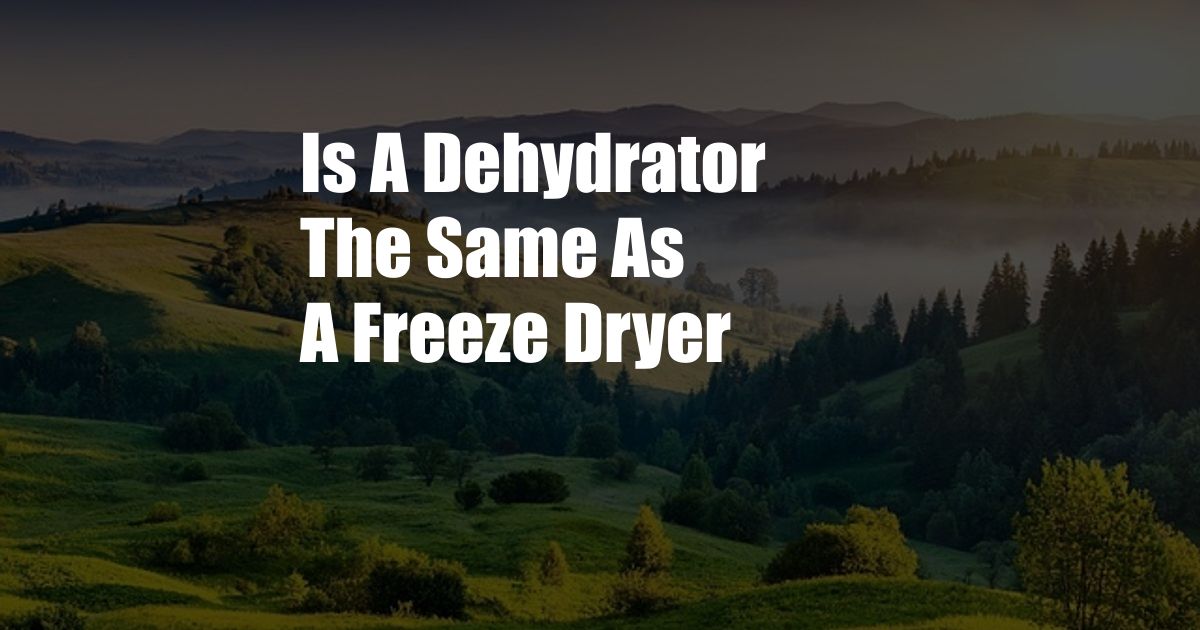
Is a Dehydrator the Same as a Freeze Dryer?
Preserving food has been practiced for centuries, from traditional drying methods like sun-drying and smoking to modern techniques such as freezing and dehydration. In recent times, freeze drying has emerged as a popular choice for preserving food, raising the question of its similarities and differences with dehydration.
While both dehydrators and freeze dryers aim to remove moisture from food to extend its shelf life, they employ distinct processes and achieve different preservation outcomes.
Dehydration: A Closer Look
Dehydration involves removing water from food by exposing it to warm, dry air. This process slows down bacterial growth and enzymatic reactions, which can cause spoilage. Dehydrators typically operate at temperatures between 95°F and 165°F, and the drying time can range from several hours to several days, depending on the type of food and desired moisture content.
Dehydration results in a reduction of food’s weight and volume, concentrating its flavor and making it shelf-stable at room temperature for extended periods. However, the high temperatures involved in dehydration can alter the food’s texture and nutrient content, potentially affecting its flavor and nutritional value.
Freeze Drying: Exploring the Process
Freeze drying, on the other hand, is a more advanced preservation technique that involves freezing the food first and then removing moisture through sublimation. Sublimation is a process where water molecules transition directly from a solid to a gaseous state, bypassing the liquid phase.
Freeze dryers operate in a vacuum chamber, where the frozen food is exposed to low pressure and temperature. This causes the water molecules to vaporize, leaving behind a porous, dry product. Freeze drying typically takes longer than dehydration, requiring several hours to days for complete drying.
Freeze-dried food retains its original shape, texture, and much of its nutritional value, as the low temperatures and absence of oxygen minimize nutrient loss. Freeze-dried food is lightweight, rehydrates easily, and has a significantly extended shelf life, lasting for years when stored properly.
Comparing Dehydrators and Freeze Dryers
| Feature | Dehydrator | Freeze Dryer |
|---|---|---|
| Process | Removes moisture with warm, dry air | Removes moisture through sublimation |
| Temperature | 95°F – 165°F | Below freezing |
| Time | Several hours to several days | Several hours to days |
| Effect on food | Reduces weight and volume, concentrates flavor, alters texture and nutrient content | Retains shape, texture, and nutritional value, lightweight |
| Shelf life | Extended at room temperature | Extended for years when stored properly |
Tips for Choosing Between Dehydrating and Freeze Drying
The choice between a dehydrator and a freeze dryer depends on your preservation goals and budget.
- Budget: Freeze dryers are typically more expensive than dehydrators.
- Preservation time: Freeze-drying provides a significantly longer shelf life compared to dehydration.
- Nutritional value: Freeze drying better preserves the nutritional content of food compared to dehydration.
- Versatility: Dehydrators can handle a wider variety of foods than freeze dryers.
- Convenience: Freeze drying requires more time and equipment than dehydration.
FAQ on Dehydrators and Freeze Dryers
Q: Which is better, a dehydrator or a freeze dryer?
A: The best choice depends on your individual needs. Freeze dryers preserve food better but are more expensive, while dehydrators are more economical but may alter the food’s texture and nutrient content.
Q: Can you dehydrate food in a freeze dryer?
A: No, dehydrators and freeze dryers are designed for different processes and cannot interchange their roles.
Q: How long does freeze-dried food last?
A: Freeze-dried food can last for several years when stored properly in a cool, dry environment.
Conclusion
Dehydrators and freeze dryers offer different approaches to preserving food. While both remove moisture, freeze drying excels in preserving texture, flavor, and nutritional value. The choice between the two depends on your budget, preservation goals, and the type of food you want to preserve.
If you’re seeking a budget-friendly option for preserving food at home, a dehydrator is a great choice. However, if you prioritize preserving food for extended periods and retaining its original quality, a freeze dryer is a more suitable option.